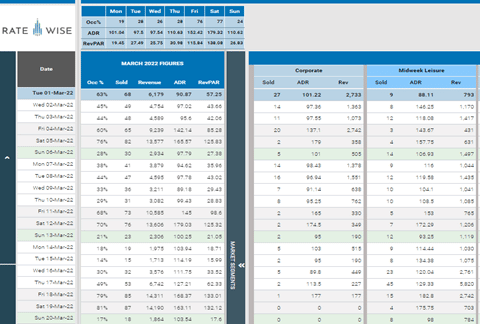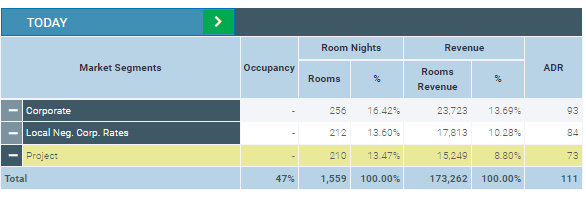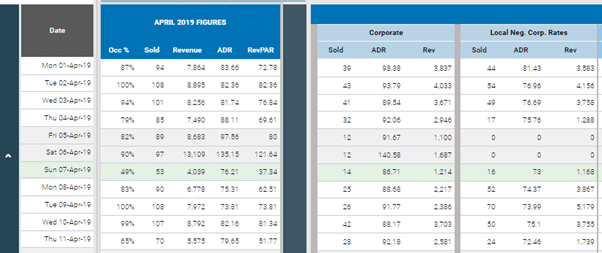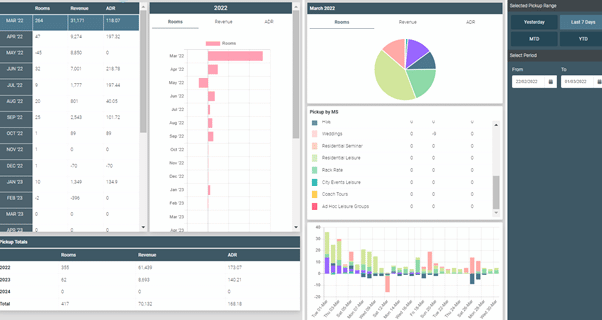Displacement Analysis (revenue displacement) is the analysis of the total value of two competing pieces of business and deciding which one is more profitable to your property.
Displacement Cost refers to the revenue lost or displaced by accepting the less profitable piece of business. This may sound very straightforward, however, it is very rare for a hotel to receive two similar enquiries on the same day for analysis. What Revenue managers must try and do is weigh up current enquiries and estimate where the future occupancies and revenues will end up & make their analysis based on these factors. Your decision must be based on historical data, current pick-up trends, future data, and current market performance.
WHY IS DISPLACEMENT ANALYSIS IMPORTANT?
It is the responsibility of the revenue team to drive as much revenue as possible to the bottom line. Displacement analysis is a calculated decision to ensure you take the correct piece of business for the property. It is important that all departments; Conference, Sales, Revenue, and Reservations teams work in harmony and towards a collective strategy, they must not be competing.
COMMON EXAMPLES OF WHERE DISPLACEMENT CAN TAKE PLACE
GROUP ENQUIRIES
Group enquiries tend to be straightforward, the enquiry holds all the details like food & beverage spend, length of stay, number of rooms, etc.
TRANSIENT BUSINESS
With transient business, we must estimate their performance including the following factors:
- Transient guests’ average spend in food and beverage departments
- Transient guests’ average length of stay
- What percentage of your transient business comes from OTA/OWS and what commission is payable?
If the value of the transient booking (taking into account all of the above factors) is more than that of the group booking, it would make more sense to accept the transient booking in this scenario & deny the group.
SHOULDER NIGHT DISPLACEMENT
When analysing any piece of business it is important to bear in mind what the implications are for the shoulder nights. For example, taking a group enquiry for a Saturday night for one night could have an impact on Friday night’s occupancy. Also, keep in mind the loss of sales on the shoulder nights to the food and beverage department as a result of this action.
Our tool gives days of week analysis by market segment, which can help with analysing past and future data and performance by day of the week.

LNR CONTRACTS
Local negotiated rate (LNR) corporate accounts or top-performing corporate accounts, as grateful as we are for them, there are some factors worth analysing before signing or extending an LNR contract into a new business year.
What is the volume of rooms on these key accounts, are they occupying a large percentage of your overall occupancy and leaving the hotel exposed? Should they stop using your hotel or have a change in travel policy?
What is their day of week performance, is it leaving shoulder corporate nights with low occupancy?
Have you analysed their additional spending on food and beverage? Are they only booking the standard room type, using all of this entry room stock, and leaving you to try and sell higher value rooms to ad-hoc corporates?
In the example below you can see a particular market segment is delivering 13.47% of your room nights but only 8.8% of your revenue, and as a result, the ADR is very low. In this scenario, this market segment is displacing other higher value pieces of business.

In the next example below, you can see LNR contracts are taking the majority share of room stock on midweek dates and displacing normal Corporate Contracts, which are achieving higher ADRs.

LAST ROOM AVAILABILITY CONTRACTS
Last room availability contracts can often form part of an LNR or GDS contract. This clause in the contract guarantees companies can always book the last available room at their contracted rate. In the scenario where you are yielding up on your last available room(s) and holding out for the highest possible rate, are any LRA accounts displacing higher rate business?
What is the frequency of this displacement? It is important to look at the day of week patterns of these LRAs stays.
Should these contracts be removed to non-LRA? These are all questions you should be asking before contract renewals take place.
CONCLUSION
To summarise, your revenue displacement calculations should include the following:
- Length of stay
- Length of stay impact on housekeeping costs
- Shoulder nights
- Food & beverage sales
- Commission
- Be aware of pickup trends
In the example below, you can see our pickup tool allows you to look at pickup patterns for any date range. This will help you to make more calculated decisions.

All of these analysis reports are available in the Rate Wise RMS system. Contact [email protected] for more details or to arrange a demo.



